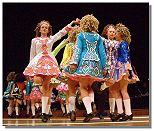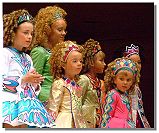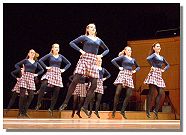 Scottish Tattoo 2003
Scottish Tattoo 2003
Background to the Scottish Tattoo
This is the fifth year in which the "Scottish Tattoo" has been staged in venues across the United Kingdom. In addition to shows in Edinburgh (Usher Hall) and Glasgow (Royal Concert Hall), venues include towns and cities in England. So pipers, drummers, Scottish country dancers, Irish dancers, a brass band and Scots and Gaelic singers have brought the culture of Scotland and the Celts to Manchester, Birmingham, Liverpool, Sheffield and Nottingham, allowing expatriates and locals alike to hear and see the sights and sounds seen more often north of the Border.
As in previous years, the show had a theme - on this occasion, the infamous Massacre of Glencoe, which still reverberates down through Scottish history from the incident in 1692. In the first half of the Tattoo, three presenters told the story of the massacre, interspersed with the pipes and drums, singing and dancing. The actors represented Alastair MacIain, the chief of the branch of the MacDonald clan which was attacked by government troops, Sir Colin Campbell who commanded the redcoats and the Earl of Stair who signed the order for the elimination of the MacIains. At the end of the first half the audience were asked to vote on who was responsible for the crime. Despite the story being slanted to point the finger at the Earl of Stair (historically, a reasonable viewpoint) the audiences in both Edinburgh and Glasgow were in no doubt that that Cambell was to blame!
The show was hosted by singer/entertainers Moira Kerr and Stuart Barbour who also sang a number of popular ballads.
I was fortunate enough to be on the front row of the stalls at the Edinburgh and Glasgow shows and the photos in this feature were taken on these most enjoyable occasions. The Glasgow concert was particularly entertaining, not just because the Glaswegian audience reacted more, but because the show was taking place on the day after the World Pipe Championships on Glasgow Green had been won by the pipers and drummers performing that evening - the House of Edgar Shotts & Dykehead Pipe Band. The band were understandably in high spirits - and that communicated itself to the other performers and the audience!
If you want to find out more about the Scottish Tattoo or get the dates of future performances, see the Scottish Tattoo Web site.
Just click on the thumbnails to see a larger version of the illustration - you can come back to this index or take a tour through all the graphics.
Where else would you like to go in Scotland?
























